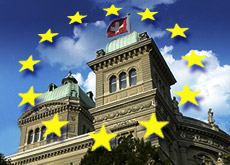
Cabinet sets out stall for EU negotiations

The Swiss government is to clarify its position on the second round of bilateral accords with the European Union, as negotiations drag on.
Switzerland still hopes to join the Schengen accord on cross-border crime, but it now looks certain that no agreement will be reached on that until the other dossiers are settled.
Cabinet ministers – who are openly divided over the document – met on Wednesday to agree a common negotiating position.
Two out of the nine dossiers are still on the table: Schengen and combating fraud.
Over the past few weeks, negotiations with the EU on these two accords have seemed to inch closer to agreement, but both sides still need to make compromises.
When is tax evasion fraud?
In both dossiers the sticking point is the EU’s insistence that Switzerland agree to judicial cooperation not only in cases of fraud but also in tax evasion. Switzerland rejects this as a threat to its banking secrecy tradition.
Bern managed to stick to its guns in tough negotiations on the savings tax issue, and looks likely to make similar progress over Schengen and customs fraud.
In the case of the Schengen accord, Switzerland could strike a compromise by adopting what is known as the “Luxembourg model”.
This would mean integrating the Schengen provision on judicial cooperation into federal law. But banking secrecy would only be lifted in cases where there was proof of criminal intention.
It was this fudge that allowed Luxembourg to sign up to Schengen while at the same time preserving banking secrecy.
In the dossier on fraud, the sticking points are the issues of indirect duties and taxes (VAT and customs duties). Bern would have to agree to judicial cooperation not just in cases of fraud but also in cases of major tax evasion.
A definite “no”
But even before the negotiations have been concluded, the rightwing Swiss People’s Party and the Campaign for an Independent and Neutral Switzerland have declared their opposition and threatened to call a referendum.
What they are most opposed to is the fact that Schengen would do away with routine border checks.
For People’s Party president Ueli Maurer, reducing border security would not create a secure region but an insecure one, with badly protected borders to the south and east.
Currently only two to three per cent of the 700,000 people who cross the Swiss border each day undergo security checks.
Switzerland must not allow itself to be put under pressure, thundered Maurer as the Germans stepped up border controls along the frontier with Switzerland earlier this month in the spirit of Schengen.
Germany has not yet eased the controls, and there has also been speculation that the French or Italians could decide to follow the Schengen convention to the letter.
A first step?
The People’s Party also bemoans the fact that Switzerland, as a Schengen signatory, would have little say in the implementation of its provisions.
As a non-EU member, Switzerland would be able to take part in discussions on changes to the convention, but wouldn’t be able to participate in votes.
Membership of the Schengen accord would totally change bilateral relations with the EU, the party argues. Not only would Switzerland have to adopt existing laws, it would also have to adopt future legislation, with as yet unknown ramifications.
Until Switzerland joins the EU it will never be able fully to participate in European security and asylum policy.
For these reasons the People’s Party and the Campaign for an Independent and Neutral Switzerland reject the Schengen convention as a form of colonialism and as a first step towards EU membership.
A watered-down Schengen
But even these EU opponents would not be against Switzerland adopting provisions of the Schengen accord which are to the country’s advantage, for example the Schengen Information System.
The People’s Party would also welcome Switzerland signing up to the Dublin agreement, which unifies European asylum practice and could help Switzerland curb the influx of asylum seekers.
Of particular interest is Eurodac, the European fingerprint database that enables the authorities to determine whether an asylum seeker has made a previous application to another country, in which case that country would be responsible for processing the application or repatriating the individual.
According to unofficial estimates, around 20 to 30 per cent of people seeking asylum in Switzerland have previously applied to another country.
So far the Schengen signatory states have categorically ruled out allowing non-members to sign up to individual provisions. Switzerland’s choices are either to accept the accord as a whole, or to stay out of Schengen and live with the consequences.
swissinfo, Katrin Holenstein
Switzerland is negotiating entry to Schengen as part of its second series of bilateral accords with the EU.
Border controls have all but disappeared in the Schengen zone, while controls have been stepped up at external borders with non-Schengen countries.
The Schengen Information System (SIS) is an electronic database of information on specific individuals, as well as vehicles and objects which are lost or stolen.
The 15 Schengen members work together to combat organised crime and illegal immigration.
The Dublin accord is closely linked to Schengen and regulates asylum requests across Europe.
The Eurodac fingerprint index allows the identification of individuals who have requested asylum in more than one country.

In compliance with the JTI standards
More: SWI swissinfo.ch certified by the Journalism Trust Initiative





























You can find an overview of ongoing debates with our journalists here . Please join us!
If you want to start a conversation about a topic raised in this article or want to report factual errors, email us at english@swissinfo.ch.